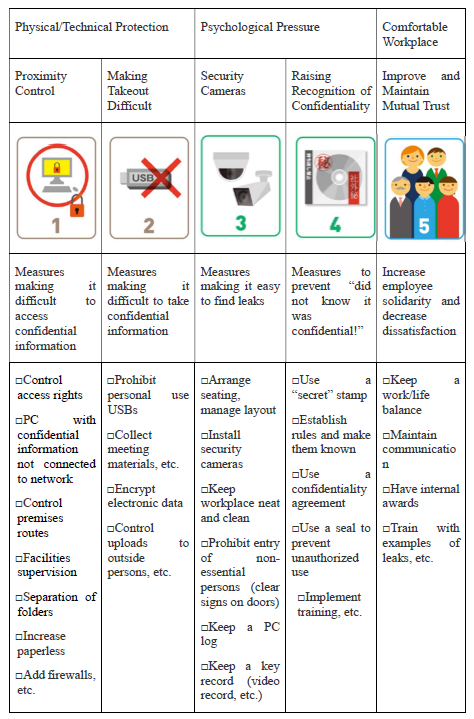Author: Kenichi Yamakoshi
1. In recent years there have been reports of cases where a retiree leaks secrets of an entity (for example, a former employee of SoftBank carried information regarding “5G” technology to his new position at Rakuten Mobile and was arrested and sued).
In actual fact, according to an investigation report published in March of last year by the Information-technology Promotion Agency (IPA), the most used route for leaking business secrets is “leaks by mid-career retirees (officers/regular employees)” (36.3%).
2. In regard to measures for leaks of information of entities, the “Protection of confidential information handbook ~ improving entity value” published by the Ministry of Economy, Trade and Industry sets out in detail and is a useful reference so we introduce an outline below.
Preventive measures for information leaks from “Protection of confidential information handbook” ~ 5 “purposes of preventive measures” to be taken for efficiency:*establishing 5 “purposes of preventive measures” considering the causes of leaks
*choosing countermeasures in a form not unreasonable, wasteful, or uneven for each goal, each route, and depending on the situation at each company

(Ministry of Economy, Trade and Industry (Protection of confidential information handbook ~ improving entity value)(https://www.meti.go.jp/policy/economy/chizai/chiteki/pdf/1706blueppt.pdf))
3. However, implementing a strict one-rule for all confidential information will, on the contrary, harm smooth operations and result in unnecessary costs, so it is important to choose implementation of a reasonable and effective countermeasure by considering
①who will hold the information,
②what will be the effect on the company if the information is leaked,
③how much can the risk of a leak be reduced by the measure,
④how much will the measure affect the smooth use of information in actual operation,
⑤and what will be the cost of implementing the measure.
A relatively easy measure to implement from the point of view of the above ④ and ⑤ is to affix “Secret”, etc., to the information and limit the use of the information to certain persons with a mutual password, etc., which has a certain level of effect, and for handling after a leak occurs provides an important measure of protection as “business confidential” under the unfair competition laws and for a claim for damages under the civil law or a criminal investigation and is a high priority measure.
Having employees sign an agreement or having recognition of a confidentiality requirement in the employee rules at the time of entry and retirement is also a relatively easy to implement measure, and at that time an employee who has a possibility to learn confidential information can be required at the time of retirement to bear a non-competition obligation for a certain length of time, which is effective in preventing leaks.
In addition to these normal measures, especially in regard to information used by a person who will retire where the danger of a leak is high and there is a possibility for the person to go to a competitor, as soon as the employee, etc., files for retirement the access rights to internal information should promptly by limited or cancelled and the email and PC logs should be checked thoroughly, etc., to implement strict measures which will be important for preventing in advance any leaks.
4. Confidential information is an important intellectual asset held by the company regardless of business sector and size, and we recommend that any company that has not been consciously taking measures to protect its confidential information should take this opportunity to reconsider an internal control system.
Note that the MEILIN Channel has a video addressing this point as “[The 100 billion yen suit] thinking about protecting business secrets”, and we hope that you will see it.
https://www.meilin-law.jp/meilin-channel/video/index.php
- We deliver valuable and useful information on matters relating to corporate law and investment mainly from our seven offices; Fukuoka, Tokyo, Shanghai, Hong Kong, Singapore, Hanoi and Ho Chi Minh.
- This article was drafted in the past based on the laws and cases applicable at that time. However, the laws and/or regulations may have been amended since then. Please note that we do not guarantee the legal accuracy of this article. Please contact us for the latest laws/regulations information.

